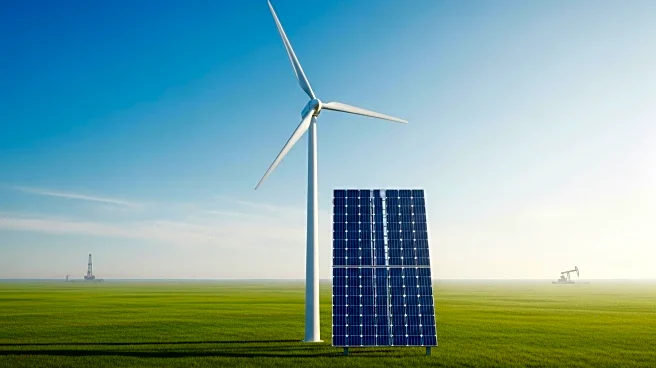What's Happening?
China is rapidly advancing its renewable energy sector, reshaping global energy choices and challenging the U.S.'s reliance on fossil fuels. According to a report by Ember, China's investment in renewables and electrification is creating conditions for a global decline in fossil fuel use. In 2024, China invested $625 billion in renewable energy, accounting for nearly a third of global clean energy funding. This shift is part of China's broader strategy to establish an 'ecological civilization' that integrates economic, social, and environmental goals. The report highlights China's role in driving down costs for key technologies like wind turbines, solar panels, and electric vehicles, benefiting emerging markets worldwide.
Why It's Important?
China's transition to renewable energy has significant implications for global energy markets and climate policy. As China reduces its dependence on fossil fuels, it sets a precedent for other nations, particularly in Southeast Asia, where energy demand is rising. This shift challenges the U.S.'s current energy policies, which remain heavily reliant on fossil fuels. The report suggests that China's clean energy investments are stimulating economic growth, creating jobs, and reducing energy costs, offering a model for sustainable development. The U.S. may face economic and geopolitical consequences if it fails to adapt to these global energy trends.
What's Next?
The report indicates that global fossil fuel demand may enter a structural decline by 2030 if current trends continue. This could lead to significant shifts in energy policy and economic strategies worldwide. Countries that rely on exporting fossil fuels may need to reconsider their economic growth plans. The U.S. might need to accelerate its transition to renewable energy to maintain its leadership in global energy markets. Additionally, China's advancements in clean energy technology could drive further innovation and cost reductions, influencing energy policies in other nations.
Beyond the Headlines
China's renewable energy strategy not only addresses climate change but also enhances energy security and economic development. By reducing its reliance on imported fossil fuels, China is positioning itself as a leader in the global energy transition. This approach challenges the notion that economic growth and environmental sustainability are mutually exclusive. As China demonstrates the viability of a green economy, it may inspire other countries to pursue similar paths, potentially leading to a more sustainable and equitable global energy landscape.










